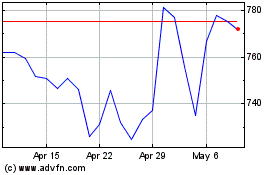NIH Requires More Transparency in Human Research
February 03 2018 - 8:29AM
Dow Jones News
By Daniela Hernandez and Amy Dockser Marcus
The National Institutes of Health has established sweeping new
rules governing research conducted on humans, requiring scientists
who receive federal funding to publicly disclose more of their
research -- and causing confusion and consternation at some
institutions.
The guidelines expand what constitutes a clinical trial and
require scientists to register a larger swath of human research on
the public online repository for clinical trials,
Clinicaltrials.gov. Researchers must now report their findings on
the site within a year of study completion or risk losing future
funding. Previously, they were only required to post results of
certain studies submitted to the U.S. Food and Drug Administration,
with the expectation that results would be published in academic
journals.
The new rules are part of a push for greater transparency and
accountability for the NIH's huge investment in biomedical
research. In the past, many organizations have failed to properly
register studies and report their findings, actions that NIH
officials say result in misspent funds, potential human harm and a
lack of public trust in science. NIH invests about $3 billion
annually in biomedical research.
"This suite of policies was designed to begin to solve some of
these problems," said Carrie Wolinetz, NIH's associate director for
science policy, adding that it will help the agency keep a better
record of the number and kind of trials it funds. Ultimately, the
goal is to improve the quality of science nationwide, she said.
The changes, which have been in the works for years, became
official in January but the effects will roll out over time as
researchers begin to propose, conduct and publish new research.
Some scientists say the changes add undue burdens, especially
for behavioral scientists and psychologists doing research, such as
questions related to human development or basic brain function,
that hasn't traditionally fallen under the definition of a clinical
trial. Under the new rules, a study is considered a clinical trial
if the work involves humans, assigns volunteers to an intervention
before the start of the study, evaluates the effect of an
intervention on volunteers, and measures health-related biomedical
or behavioral outcomes.
The new guidelines would make basic behavioral and functional
research subject to more stringent registration and reporting
requirements. But such studies don't pose the same risks to humans
as a traditional clinical trial, according to a letter sent to the
NIH last year by four organizations that represent hundreds of
academic and medical institutions, expressing concern about the
rules.
Some academic medical and pharmaceutical companies said they
have increased their staff to handle the additional paperwork or
had current employees take on more responsibilities.
Stanford University School of Medicine is "adding five or six
full-time employees to our overall infrastructure for human
research," said Mark Cullen, senior associate dean for
research.
Dr. Cullen said many of his researchers are still worried and
confused about how the new policies will affect their work; the new
hires are meant to add to an existing support system made up of
roughly 100 staffers.
Universities and research organizations are also updating
websites and forms to reflect the new requirements, holding town
halls to answer questions and train investigators, and providing
information through online training, according to Evan Mayo-Wilson,
an assistant scientist at Johns Hopkins Bloomberg School of Public
Health and a co-author of a letter published in Nature Human
Behaviour arguing that the NIH policy presents challenges for
behavioral scientists.
Dr. Mayo-Wilson said he was working with a national group of
administrators to determine if academic organizations have the
staff and resources they need to insure compliance. They are
planning a follow-up study in the spring.
Eli Lilly & Co. has about 10 people companywide involved
with "transparency and reporting," and those employees "have picked
up a little more work," said Ben Rotz, the drugmaker's senior
adviser for global medical strategy and operations. But, he added,
Lilly is already experienced with Clinicaltrials.gov and has
"already gone beyond" the new requirements.
Some scientists say they fear the reporting requirements could
hurt their prospects for future funding if they have to post all
studies that yielded negative results. Under the old rules that
required publication in journals, negative results often remained
undisclosed because journals prefer to publish positive
findings.
"The release of negative results not only prevents duplication
and potential unnecessary risk to human volunteers, it also
advances our understanding of the science," said NIH's Dr.
Wolinetz.
Another question in scientists' minds: Will these new rules be
enforced?
Rules will drive change only if the NIH and the FDA, which
approves human trials, are willing to enforce compliance, medical
ethicists said. In the past, NIH has been reticent to police
scientists who don't share their results, some scientists said. Dr.
Wolinetz said NIH was "fully prepared to enforce our policies."
Write to Daniela Hernandez at daniela.hernandez@wsj.com and Amy
Dockser Marcus at amy.marcus@wsj.com
(END) Dow Jones Newswires
February 03, 2018 08:14 ET (13:14 GMT)
Copyright (c) 2018 Dow Jones & Company, Inc.
Eli Lilly (NYSE:LLY)
Historical Stock Chart
From Mar 2024 to Apr 2024

Eli Lilly (NYSE:LLY)
Historical Stock Chart
From Apr 2023 to Apr 2024
